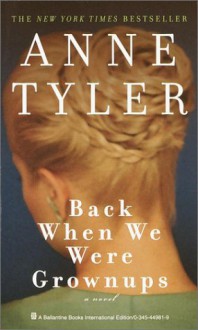The first sentence of Anne Tyler's 15th novel sounds like something out of a fairy tale: "Once upon a time, there was a woman who discovered she had turned into the wrong person." Alas, this discovery has less to do with magic than with a late-middle-age crisis, which is visited upon Rebecca...
show more
The first sentence of Anne Tyler's 15th novel sounds like something out of a fairy tale: "Once upon a time, there was a woman who discovered she had turned into the wrong person." Alas, this discovery has less to do with magic than with a late-middle-age crisis, which is visited upon Rebecca Davitch in the opening pages of Back When We Were Grownups. At 53, this perpetually agreeable widow is "wide and soft and dimpled, with two short wings of dry, fair hair flaring almost horizontally from a center part." Given her role as the matriarch of a large family--and the proprietress of a party-and-catering concern, the Open Arms--Rebecca is both personally and professionally inclined toward jollity. But at an engagement bash for one of her multiple stepdaughters, she finds herself questioning everything about her life: "How on earth did I get like this? How? How did I ever become this person who's not really me?" She spends the rest of the novel attempting to answer these questions--and trying to resurrect her older, extinguished self. Should she take up the research she began back in college on Robert E. Lee's motivation for joining the Confederacy? More to the point, should she take up with her college sweetheart, who's now divorced and living within easy striking range? None of these quick fixes pans out exactly as Rebecca imagines. What she emerges with is a kind of radiant resignation, best expressed by 100-year-old Poppy on his birthday: "There is no true life. Your true life is the one you end up with, whatever it may be." A tautology, perhaps, but Tyler's delicate, densely populated novel makes it stick. Yes, Poppy. There are also characters named NoNo, Biddy, and Min Foo--the sort of saccharine roll call that might send many a reader scampering in the opposite direction. But Tyler knows exactly how to mingle the sweet with the sour, and in Back When We Were Grownups she manages this balancing act like the old pro she is. Even the familiar backdrop--shabby-genteel Baltimore, which resembles a virtual game preserve of Tylerian eccentrics--seems freshly observed. Can any human being really resist this novel? It is, to quote Rebecca, "a report on what it was like to be alive," and an appealingly accurate one to boot. --James Marcus
show less






 15 years ago
15 years ago